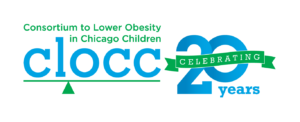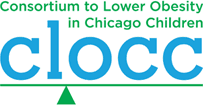By Adam Becker, PhD, MPH
Executive Director, Consortium to Lower Obesity in Chicago Children
Dear partners and colleagues, welcome to 2022!
 Those of you who have been counting may have realized that 2022 marks CLOCC’s 20th year as a childhood obesity prevention network. We have much planned to celebrate this important milestone, but I’ll get to that a bit further down… 2021 was another year of tremendous uncertainty and change. As COVID-19 rates rose, fell, and rose again, we all pivoted from virtual, to in-person, to blended programming and activities that allowed us sometimes to be in shared spaces and other times forced us back online. Through it all, CLOCC partners and staff worked valiantly to make available as much information and support as we could – for each other, and for the children and families who needed them. Advancing health equity continued to be at the forefront of our network’s efforts, with a focus on food insecurity, transportation equity, and upstream factors that influence nutrition and physical activity. The bad news is that 2022 seems to be starting out with similar challenges. The good news is that the tools and processes we built last year will allow us to be nimble and responsive as the ground continues to shift. Much has been shared in the news about the linkages between obesity and COVID-19, about the impact on kids of not having the structure of a school day to support good nutrition and physical activity, and about how the pandemic has eroded the financial status of so many families. The need to work on these issues continues – and the CLOCC staff is committed to helping you keep obesity prevention on the forefront of your efforts.
Those of you who have been counting may have realized that 2022 marks CLOCC’s 20th year as a childhood obesity prevention network. We have much planned to celebrate this important milestone, but I’ll get to that a bit further down… 2021 was another year of tremendous uncertainty and change. As COVID-19 rates rose, fell, and rose again, we all pivoted from virtual, to in-person, to blended programming and activities that allowed us sometimes to be in shared spaces and other times forced us back online. Through it all, CLOCC partners and staff worked valiantly to make available as much information and support as we could – for each other, and for the children and families who needed them. Advancing health equity continued to be at the forefront of our network’s efforts, with a focus on food insecurity, transportation equity, and upstream factors that influence nutrition and physical activity. The bad news is that 2022 seems to be starting out with similar challenges. The good news is that the tools and processes we built last year will allow us to be nimble and responsive as the ground continues to shift. Much has been shared in the news about the linkages between obesity and COVID-19, about the impact on kids of not having the structure of a school day to support good nutrition and physical activity, and about how the pandemic has eroded the financial status of so many families. The need to work on these issues continues – and the CLOCC staff is committed to helping you keep obesity prevention on the forefront of your efforts.
It is my honor and pleasure to sum up a few of the successes we’ve had over the past year, and to share some of what’s to come as we celebrate our network’s 20th anniversary. We conducted a partner survey to understand the usefulness of the COVID-related changes we made to our core functions of convening, communicating, and collaborating. Fifty percent of respondents reported using the CLOCC Healthy at Home page on our website, designed provide partners with messaging and interventions adapted to the virtual environment. On a scale of 1 (lowest) to 5 (highest), users reported an average score of 4.3 regarding how useful the page was for their work. When asked whether they clicked on the “News and Resources: COVID-19” section of our e-newsletter, 62.5% said they had. They rated the usefulness of this section to their work at an average of 4.14 on a scale of 1 to 5. While COVID-19, political and social unrest, and economic challenges continued to dominate, 75% of CLOCC partners maintained or increased their level of engagement with CLOCC’s resources.
Collaboration among CLOCC partners resulted in key policy and advocacy victories in 2021. Chicago Mayor Lori Lightfoot’s office established a Food Equity Council to advance a Food Equity Agenda and earmarked $10,000,000 in the city’s budget to implement food equity strategies. We saw the appropriation of $500,000 to the Illinois Healthy Local Food Incentives Fund that will double the money SNAP users can spend at farmers markets. We advocated through the Illinois Alliance to Prevention Obesity (IAPO) and, finally, after years of effort, saw the formal publication of draft requirements for health-related policy in childcare group homes. These requirements will improve the guidelines for licensed childcare centers and are now under final review with the Illinois Department of Children and Family Services. Illinois also announced a new law to make healthy beverages the default in restaurant kids’ meals, and Chicago’s City Council is now considering an ordinance to codify that law at the local level. At the federal level, we successfully advocated for critical child nutrition and anti-poverty provisions in the current version of the White House’s Build Back Better Bill.
Together, we continued to support child-serving institutions in their efforts to improve child health and wellness. CLOCC and Chicago Public Schools continued to co-convene the +Network and Food and Fitness Partner Network. Each group of partners focused on advancing the District’s local school wellness policy through the Healthy CPS initiative. CLOCC and the Chicago Park District concluded a four-year initiative that integrated 5-4-3-2-1 Go! messaging with summer camp activities at six Chicago parks. Through CLOCC’s leadership of West Side United’s Healthy Food Access Working Group, we increased seven West Side food pantries’ capacity to provide healthy food and nutrition education to their clients. Communities across Chicago continued to engage in CLOCC’s Neighborhood Walkability and Accessibility Initiative (NWAI) to identify and address challenges to walking and other forms of active transportation and we have seen that engagement lead to transportation infrastructure changes from Belmont Cragin on to Garfield Park 2021 was truly a remarkable year, with significant challenges but important accomplishments.
 So, what lies ahead in 2022? It’s going to be a BIG year of celebrating our 20 years together, helping to address and prevent childhood obesity in Chicago and beyond. We will convene the network in February to review progress on our current annual goals, discuss strategies for accomplishing them by the end of our fiscal year in August 2022, and announce some restructuring of the network leadership that will help us bring obesity prevention forward over the next 20 years. In the coming days, we will announce a “20 Under 20” initiative to identify and recognize a collection of Chicago’s young leaders in obesity prevention and related areas. We will be formally introducing two curricula in 2022 focused on our two healthy lifestyle messages. “Healthy Food, Healthy You, Healthy Planet” is based on the 5-4-3-2-1 Go! message with content and activities designed to engage youth beyond the 3-to-5-year-old focus we’ve had since the development of the message. A new fiveSMART curriculum will support partners working with people who are pregnant or parenting young children, with evidence-based recommendations for obesity prevention in the earliest stages of child development. Our Neighborhood Walkability and Accessibility Assessment Tool (NWAAT) will go digital this year, making the collection, analysis, and dissemination of data easier for communities when advocating for policy, systems, and environmental changes. In November, our celebration of CLOCC’s first 20 years will conclude with a network convening, where we will introduce new resources to connect upstream root causes with downstream effects on nutrition, physical activity, and obesity.
So, what lies ahead in 2022? It’s going to be a BIG year of celebrating our 20 years together, helping to address and prevent childhood obesity in Chicago and beyond. We will convene the network in February to review progress on our current annual goals, discuss strategies for accomplishing them by the end of our fiscal year in August 2022, and announce some restructuring of the network leadership that will help us bring obesity prevention forward over the next 20 years. In the coming days, we will announce a “20 Under 20” initiative to identify and recognize a collection of Chicago’s young leaders in obesity prevention and related areas. We will be formally introducing two curricula in 2022 focused on our two healthy lifestyle messages. “Healthy Food, Healthy You, Healthy Planet” is based on the 5-4-3-2-1 Go! message with content and activities designed to engage youth beyond the 3-to-5-year-old focus we’ve had since the development of the message. A new fiveSMART curriculum will support partners working with people who are pregnant or parenting young children, with evidence-based recommendations for obesity prevention in the earliest stages of child development. Our Neighborhood Walkability and Accessibility Assessment Tool (NWAAT) will go digital this year, making the collection, analysis, and dissemination of data easier for communities when advocating for policy, systems, and environmental changes. In November, our celebration of CLOCC’s first 20 years will conclude with a network convening, where we will introduce new resources to connect upstream root causes with downstream effects on nutrition, physical activity, and obesity.
The CLOCC staff looks forward to continued work with all of you as we address the factors that contribute to obesity at all levels – from achieving racial justice to improving food and physical activity access, to educating and motivating children and their families to eat healthy and stay active. Please join us in a virtual “cheers” as we toast to a happier, healthier, safer, and more equitable 2022 and as we celebrate 20 years together!

